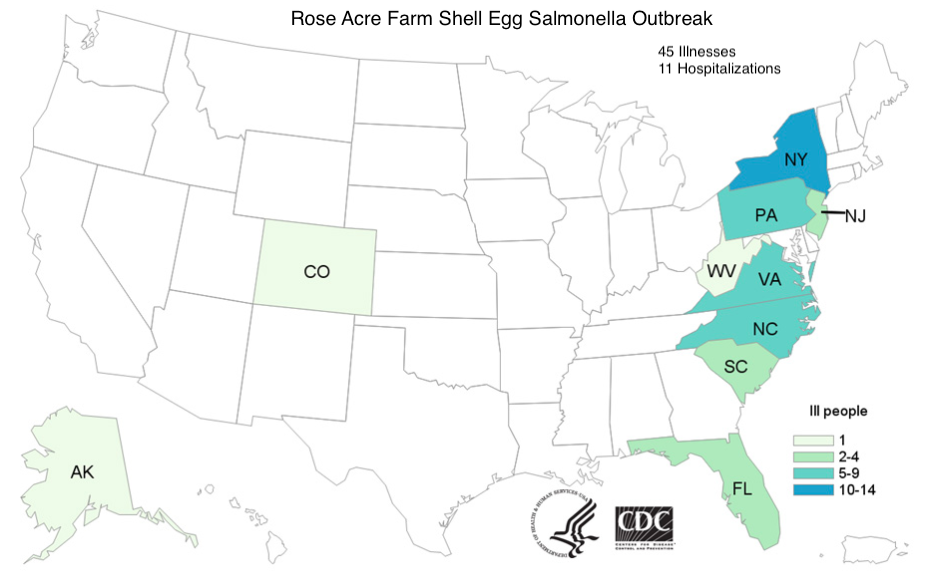
Contact the Pritzker Hageman Salmonella Team
Rose Acre Farm Salmonella Shell Egg Outbreak Investigation
After learning of a cluster of illnesses associated with the consumption of Rose Acre Farm shell eggs, the U.S. Food and Drug Administration (FDA) began an inspection of the company’s facility in Hyde County, NC. There they found rodent problems and other “objectionable conditions and practices.”
FDA inspectors conducted tests on environmental samples the collected from the facility. Results of the lab tests showed a match to the rare outbreak strain of Salmonella Braenderup that had been cultured from patients. “This evidence demonstrates that eggs from the Rose Acre Farms’ Hyde County farm are the likely source of the outbreak,” the FDA stated in an outbreak report. That finding prompted recalls from both Rose Acre Farms and Cal-Maine Foods which included more than 200 million eggs.
“The Salmonella lawyers at national food safety law firm Pritzker Hageman have represented people in every major outbreak in the last 20 years. Almost all of them could have been prevented had basic safety and sanitation practices been followed,” said Fred Pritzker, founding partner of Pritzker Hageman. “We hold suppliers, restaurants and retailers accountable.”
The Centers for Disease Control and Prevention (CDC) pulsed-field gel electrophoresis (PFGE) and whole genome sequencing (WGS) to identify the genetic fingerprint of the outbreak strain and scanned a national database of these “DNA fingerprints” to identify 45 case-patients from 10 states. The case count by state when the agency declared an end to the outbreak on June 14 was as follows: Alaska (1), Colorado (1), Florida (2), New Jersey (2), New York (14), North Carolina (6), Pennsylvania (6), South Carolina (4), Virginia (8), and West Virginia (1).
Case-patients, who range in age from 1 to 90 years old, reported onset-of-illness dates from November 16, 2017 to May 13, 2018. The median age was 60. Fifty-six percent of those sickened were female. Testing on the outbreak isolates showed no resistance to antibiotics. Eleven people were so sick they needed to be hospitalized. No deaths were reported.
In interviews, ill people answered questions about the foods they ate and other exposures in the week before they became ill. Thirty (83%) of 36 people interviewed reported eating shell eggs. Nineteen (53%) reported eating various egg dishes at different restaurants. This latter percentage is significantly higher than results from a survey[PDF – 787 KB] of healthy people in which 38% of respondents reported eating any eggs away from home in the week before they were interviewed. These restaurants reported using shell eggs in the dishes eaten by ill people.
Salmonella and Eggs
Symptoms of a Salmonella infection include nausea, fever and abdominal cramps. These symptoms usually develop between six to 72 hours of exposure and last about a week. Children, seniors and those with weakened immune systems are most at risk of developing a Salmonella infection.
The FDA estimates that eggs contaminated with Salmonella are the source of 79,000 cases of foodborne illness and 30 deaths each year. To reduce the risk of becoming sick, the agency says consumers should follow these guidelines when handling eggs:
- Only buy eggs sold from a refrigerator or refrigerated case.
- Make sure eggs are clean and the shells are not cracked before buying them.
- Refrigerate them as quickly as possible.
- Store eggs in their original carton and use them within three weeks.
- Use hard-cooked eggs within one week.
- Whole eggs or egg whites can be beaten and frozen, they should be used within one year.
- Refrigerate leftover cooked egg dishes and use within 3 to 4 days.
- When preparing eggs, wash hands, equipment and work surfaces that come into contact with raw eggs with warm soapy water.
- Cook eggs until both the yolk and the white are firm. Scrambled eggs should not be runny.
- Bake casseroles and other dishes containing eggs to an internal temperature of 160° F. Use a food thermometer to be sure.
- Use pasteurized eggs for recipes that call for eggs that are raw or undercooked such as like Caesar salad dressing.
- Never leave cooked eggs or egg dishes out of the refrigerator for more than two hours or for more than one hour when temperatures are above 90° F.
- Keep egg dishes refrigerated until it is time to serve them.
- Serve small platters and replenish as needed.
.
